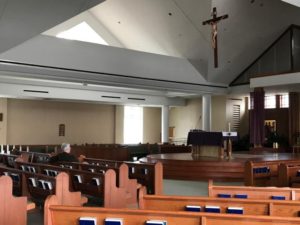
IDENTIFYING THE CHURCH OF CHRIST BY WHAT THEY TEACH AND PREACH
So many churches do wonder about the Church of Christ as to our way of teaching and preaching. Of paramount to identifying the Church of Christ as the only true church among all others, is the way we teach and preach. The importance we place on teaching and preaching in the church of Christ is one of the distinctive features that distinguish us from the rest.
To Timothy, the young evangelist, the apostle Paul wrote, “Preach the word! Be ready in season and out of season. Convince, rebuke, exhort, with all longsuffering and teaching (2Tim. 4: 2 emphasis mine). The verb preach is from the Greek word kerusso which refers to a herald who is sent by someone in authority (for instance, the king) and was to announce the message in a loud, clear voice so all could hear.
Teaching in Greek has two different words:didaskalia (that is, teaching or instruction), and didache (“the doctrine which has God and Christ the Lord, for its author and supporter”) according to Thayer’s dictionary. This means, you cannot separate doctrine from teaching, because without doctrine, there is nothing to teach. And the Bible urges Christians “that they teach no other doctrine” (1Tim. 1:3), but “sound” one (Tit. 2:1).
We normally hear from our denominational friends that doctrine is not important to salvation. They sometimes tell us to stop teaching doctrines and rather preach salvation. But what does the Scripture have to say about doctrine in relation to one’s salvation? “Take heed to yourself and to the doctrine. Continue in them, for in doing this you will save both yourself and those who hear you” (1Tim. 4: 16).
The church of Christ also lays much emphasis on preaching, because in God’s scheme of redemption, preaching plays a cardinal role (Cf. Rom. 10:14).The Lord, after His resurrection, commanded His apostles, “Go into all the world and preach the gospel to every creature. He who believes and is baptized will be saved; but he who does not believe will be condemned” (Mk. 16: 15-16).We cannot overemphasize the importance of teaching and preaching. The Scriptures do not provide any other medium through which God’s eternal purpose can be fulfilled except by teaching and preaching by His disciples.
The teaching and preaching done by the church of Christ is unique in content because we know how to “rightly divide the word of truth” (2Tim. 2: 15). And by so doing, we are able to identify the right standard of authority for our teaching and preaching. Based on first Peter 4: 11, the restorers of the New Testament church coined the popular slogan: “We speak where the Bible speaks, and we are silent where the Bible is silent.” Our purpose of teaching and preaching is, so that God may be glorified, and as such we don’t entertain any human doctrine.
Our authority for teaching and preaching is derived from the New Testament Bible. Though the Old Testament was also given by God yet, not to Christians, but to the Jews of old (Ps. 147: 19-20). When Jesus rose from the dead, He came and told His disciples “All authorityhas been given to Me in heaven and on earth. Go therefore and make disciples of all nations, baptizing them in the name of the Father and of the Son and of the Holy Spirit, teaching them to observe all things that I have commanded you…” (Matt. 28: 18-20). So, in Christianity, it is wrong to refer to Moses as your authority or David, or Malachi when you are confronted with the question: “By what authority are you doing these things?” (cf. Matt. 21: 23). We are ordered to teach people to observe all that Jesus had commanded, which is exclusively in the New Testament.
To the Hebrews Christians, the writer stated clearly that, “in these last days” (the Christian Dispensation), God has spoken to us by His Son (Heb. 1: 1-2).On the Mount of Transfiguration, the disciples (Peter, James and John) were made to understand by God from heaven that Jesus is the only one we must hear: “While he was still speaking behold, a bright cloud overshadowed them; and suddenly a voice came out of the cloud, saying, “This is My beloved Son, in whom I am well pleased. Hear Him!” (Matt. 17: 5). To the Colossians, Paul wrote, “And whatever you do in word or deed, do all in the name of the Lord Jesus, giving thanks to God the Father through Him (Col. 3: 17). “In the name of,” in this context is, “in the authority of.”
Before Jesus ascended to heaven, he delegated His authority to His apostles who taught and preached what He entrusted to them (cf. Acts 2: 42), and through the inspiration of the Holy Spirit, they recorded what they taught and preached for us, thereby producing the New Testament Scriptures. The Holy Spirit has affirmed that God has made “us sufficient as ministers of the new covenant…” (2Cor. 3: 6). Hence, the church of Christ derives her authority for teaching and preaching in the New Testament. This is not an idea formed by us, but that is what God ordained before the birth of Christ (cf. Jer. 31: 31-36). And so, Jesus only came to fulfill the will of His Father: “Then He said, “Behold, I have come to do Your will, O God.” He takes away the first that He may establish the second” (Heb. 10: 9; cf. Gal. 4: 4-5).
With that being said, we put it on record that, the church of Christ relies not on the Old Testament as our rule of faith, but to Christians, the Old Testament is there for our learning (Rom. 15: 4). Further, the church of Christ will not teach, or preach, or practice anything which the New Testament has not authorized.
Let us also explain here that, the teaching and preaching done by the church of Christ is void of human traditions or creeds. That is, the church of Christ has no creed, but the Bible (New Testament)
Written By: Bro. Joshua Aidoo: charliecoc@gmail.com / mcocminister@yahoo.com
Whatsapp: +233-56-026-5365
Mobile: +233-24-214-7930




